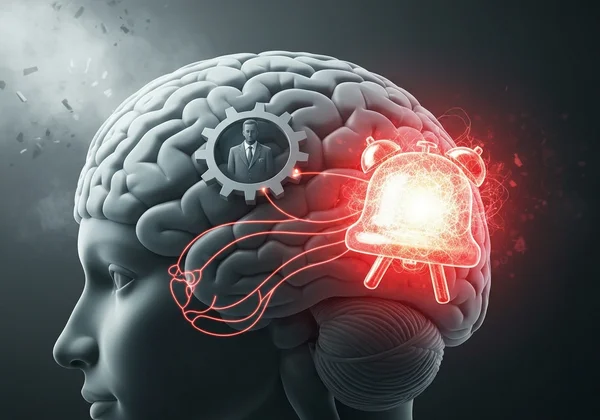Trauma Test & Executive Dysfunction: Reclaiming Focus, Memory, and Motivation
November 20, 2025 | By Nora Hayes
Have you ever stared at a simple task, feeling completely paralyzed? Do you find yourself losing your train of thought mid-sentence, or re-reading the same page over and over? For many, these daily struggles lead to self-criticism, with labels like "lazy," "unmotivated," or "disorganized." But what if these challenges aren't a reflection of your character, but a response to your experiences? How do I know if I have trauma? This question is a critical starting point, and understanding the deep connection between past events and your present functioning can be the first step toward self-compassion and clarity. An initial exploration, like a confidential trauma test, can provide valuable insights.
Understanding Executive Functions & Trauma's Impact
At the heart of our ability to plan, focus, and manage our daily lives are our executive functions. Think of them as the CEO of your brain, operating from the prefrontal cortex to manage complex cognitive processes. They help you organize tasks, regulate emotions, and stay focused on your goals.
However, when a person experiences trauma, the brain's survival system takes over. The amygdala, our internal alarm bell, becomes hyperactive, constantly scanning for threats. This state of high alert hijacks resources from the prefrontal cortex, effectively sidelining the CEO. The result is a significant disruption in executive functioning, making everyday tasks feel like monumental challenges.

What Are Executive Functions and Why Are They Crucial?
To understand the impact, it's helpful to know what we're talking about. Executive functions are a set of mental skills that include working memory, flexible thinking, and self-control. These skills are essential for:
- Planning and Prioritizing: Deciding which tasks are most important and creating a plan to complete them.
- Sustained Attention: Focusing on a single task for an extended period, even with distractions.
- Task Initiation: Overcoming inertia to simply begin an activity.
- Emotional Regulation: Managing feelings and impulses to respond appropriately to situations.
- Working Memory: Holding information in your mind while you perform complex tasks.
When these functions are impaired, life can feel chaotic and overwhelming.
How Trauma Rewires Your Brain's Control Center
Trauma isn't just an emotional wound; it leaves a physical imprint on the brain. It strengthens the neural pathways related to fear and survival while weakening those connected to the brain's control center—the prefrontal cortex.
Your brain learns that the world is unsafe and prioritizes immediate survival over long-term planning and thoughtful action. This adaptive response is brilliant for escaping an immediate threat but becomes maladaptive when the threat is gone, yet the alarm system remains stuck in the "on" position. This is why "just trying harder" often doesn't work; you're fighting against your own rewired biology. Recognizing this is a crucial step in understanding these patterns.
"Brain Fog" & Beyond: The Effect of Trauma on Focus & Memory
One of the most common and frustrating symptoms survivors report is a persistent mental haze, often described as PTSD brain fog. It’s more than simple forgetfulness; it’s a pervasive feeling of being mentally slow, confused, and disconnected. This fog directly results from the cognitive and neurological impact of trauma.
The constant state of hypervigilance drains your mental energy, leaving little left for clear thinking, memory recall, and concentration. Your brain is so busy scanning for danger that it can't fully engage with the present moment. This isn't a personal failing; it's a direct consequence of a nervous system working overtime.

The Lingering Haze: Navigating Trauma-Induced Brain Fog
Trauma-induced brain fog can manifest as difficulty concentrating in conversations, struggling to find the right words, or feeling mentally exhausted after simple tasks. It can make you feel detached from yourself and the world around you. This cognitive fatigue is real and is your body's way of telling you it's overwhelmed. Acknowledging this can be the first step towards giving yourself grace and seeking ways to understand your experience, such as an online trauma assessment.
Memory Gaps and Intrusive Thoughts: How Trauma Affects Recall
Memory gaps are another hallmark of trauma's impact. Traumatic memories are often not stored as coherent narratives. Instead, they can be fragmented—broken into sensory pieces like images, sounds, or physical sensations. This can lead to significant gaps in your memory of the event or even periods before and after it.
Conversely, you might experience intrusive memories or flashbacks, where pieces of the memory intrude into your present awareness without warning. This difficult balance between having no memory and too much memory is a direct result of how the brain processes and stores overwhelming experiences.
Why Sustained Attention Feels Impossible After Trauma
For a trauma survivor, the world can feel like a minefield of potential triggers. This creates a state of hypervigilance where your attention is constantly and unconsciously scanning the environment for threats. Because your focus is spread thin looking for danger, you have fewer cognitive resources available for sustained attention on a single, non-threatening task like reading a book, completing a work project, or listening to a loved one. Your brain prioritizes safety above all else, making deep focus a luxury it feels it can't afford.
The Struggle to Start: Trauma, Procrastination, & Motivation
If you constantly struggle with procrastination, you may have been told you’re lazy or undisciplined. However, there is a strong link between trauma and procrastination. What looks like a lack of motivation on the outside is often a complex internal battle rooted in fear, overwhelm, and a depleted capacity for self-direction.
For survivors, starting a task can feel threatening. It may trigger fears of failure, perfectionism rooted in past criticism, or a general sense of being too overwhelmed to even begin. Procrastination becomes a protective, albeit unhelpful, strategy to avoid these difficult feelings. Understanding if your patterns might be linked to past experiences can start with an initial screening.

When "Just Do It" Isn't Enough: Trauma & Procrastination
The common advice to "just do it" is often invalidating for someone whose inaction is a coping mechanism. When your nervous system is dysregulated, the mental energy required to initiate a task is enormous. Procrastination isn't a choice; it's often a symptom of your system being in a state of freeze or shutdown—a common trauma response where inaction feels like the safest option.
Decision Paralysis & Overwhelm: Trauma's Impact on Planning
Trauma can erode your trust in your own judgment. When you’ve experienced situations where your choices had severe consequences or you felt powerless, making new decisions can feel terrifying. This leads to decision paralysis, where even small choices, like what to eat for dinner, feel impossibly high-stakes. The fear of making the "wrong" choice can keep you stuck, unable to move forward with plans or projects.
Rekindling Your Drive: Gentle Steps Towards Motivation
Rebuilding motivation after trauma isn't about brute force; it's about safety and self-compassion. It starts with small, manageable steps that help your nervous system feel safe again. Breaking tasks into tiny pieces, celebrating small wins, and practicing grounding techniques can slowly rebuild your capacity for action. It's a gentle process of showing yourself that you can move forward without being overwhelmed.
Moving Forward: Recognizing & Addressing Trauma's Influence
Recognizing that your struggles with focus, memory, and motivation may be tied to trauma is a profound and validating shift in perspective. It moves the conversation from "What's wrong with me?" to "What happened to me, and how can I support myself?" This is the beginning of reclaiming your narrative and your life.
It's Not Your Character, It's Your Coping: A New Perspective
The most powerful step you can take is to embrace self-compassion. The brain fog, procrastination, and memory issues you experience are not character flaws. They are adaptive coping strategies your brain developed to survive an impossible situation. By viewing these symptoms through the lens of trauma, you can stop blaming yourself and start offering yourself the kindness and support you need to heal.

When to Explore Further: The Value of a Free Trauma Test
If this article resonates with you, exploring it further can provide much-needed clarity. A preliminary trauma assessment is not a diagnosis, but it can be a powerful tool for self-understanding. It can help you identify patterns and connect the dots between your past experiences and present-day challenges. This knowledge empowers you to take the next steps on your healing journey, whether that involves further reading, self-care practices, or seeking professional support. Are you ready to gain a clearer picture? Take our free test today.
Reclaiming Clarity and Control: Your Empowered Path Forward
The label "lazy" is a heavy burden to carry, especially when you are already struggling. The truth is, the exhaustion, brain fog, and lack of motivation you feel are often signs of a nervous system working tirelessly to keep you safe. Understanding the link between trauma and executive dysfunction is the key to unlocking a more compassionate and effective path forward.
Your struggles are real, and your feelings are valid. You are not broken or unmotivated; you are a survivor. By learning about how trauma has impacted your brain, you can begin to reclaim your focus, your memory, and your sense of control. If you are ready to take the first, gentle step toward understanding, start your free test today.
Frequently Asked Questions About Trauma & Executive Function
How do I know if my executive dysfunction is related to trauma?
While executive dysfunction can have many causes, it is often linked to trauma if you also experience symptoms like hypervigilance, flashbacks, emotional dysregulation, or avoidance of things that remind you of a past event. The symptoms often appear or worsen after a distressing experience. A screening tool like the childhood trauma test can help you see if your challenges align with common trauma-related patterns.
Can trauma-induced brain fog be reversed?
Yes, there is tremendous hope for healing. As you work to regulate your nervous system through therapy, mindfulness, and other healing practices, the brain can begin to feel safe again. When the "fight, flight, or freeze" response is no longer constantly active, cognitive resources are freed up, leading to improved clarity, focus, and memory over time.
Is chronic procrastination always a sign of trauma?
Not always. Procrastination can also be related to ADHD, depression, anxiety, or perfectionism. However, when procrastination is accompanied by a sense of dread, paralysis, or feeling overwhelmed, it is frequently connected to unresolved trauma. It's the underlying "why" that often points toward a trauma response.
Can I self-diagnose trauma based on these symptoms alone?
No. This article and the tools on our website are for educational and informational purposes only. They are designed to be a preliminary screening to help you understand your experiences, not to provide a clinical diagnosis. A formal diagnosis of PTSD or other trauma-related disorders can only be made by a qualified mental health professional. We strongly encourage you to consult with a therapist or counselor for a comprehensive assessment and personalized guidance.